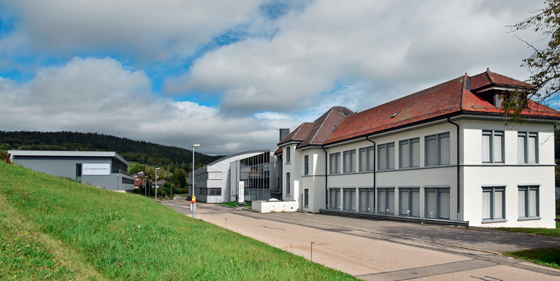
Alongside its two buildings in Le Lieu and a third in Arch (Canton Bern), the specialist of additional mechanisms has just finished moving into a new production facility at Les Charbonnières, in the Vallée de Joux.
“The watchmaking tradition of the Vallée de Joux comes from the farmer-watchmakers. Before 1880 and the arrival of mechanisation, they travelled to Geneva every spring, then to Paris and as far as London to try and sell their models. Because if they didn’t, a substantial part of the yearly revenue vanished.” Pascal Dubois knows the industrial history of his region inside out, which is hardly surprising, since he and his two brothers and two cousins represent the fourth generation at the head of the Dubois & Dépraz company. Founded in 1901, the specialist of additional mechanisms has now finished moving into its fourth production site. Having developed for a century at the heart of the village of Le Lieu, built a factory nearby in 2002 (La Combe) and bought up a bar-turning company in Arch (Canton Bern) in 2005, Dubois & Dépraz has recently inaugurated its new unit in Les Charbonnières, again in the Vallée de Joux. An opportunity to look back on almost 120 years of history.
In January 1901, Marcel Dépraz set up his watchmaking workshop on the first floor of the current building at No. 12 Grand Rue in Le Lieu. Specialising in the production and assembly of horological mechanisms of all kinds, he won a gold medal a few months later at the Vaud cantonal exhibition. In 1911, he and his brother-in-law founded a second entity, named Dépraz and Guignard.
First self-winding chronograph
Joined a few years later by his two children, Gabrielle and Roger, Marcel Dépraz hired his son-in-law Reynold Dubois in 1937. This cooperation gave rise to Calibre 48, a chronograph model produced in a run of over 3.5 million. Marcel Dépraz’s two companies then merged under the name Dépraz & Cie.
In 1956, Gabrielle and Reynold’s son Gérald Dubois, a young watchmaker-engineer, created a technical department within the company. In 1969, the work done by this R&D unit, on behalf of a pool comprising Heuer, Breitling and Hamilton/Büren, led to the development of the famous Calibre 11, the world’s first self-winding chronograph. “We can now state this openly, as it’s become common knowledge”, says the current CEO, Pierre Dubois, with a smile. Based on a modular construction, this movement evolved to become Calibre 12 and then Calibre 15, earning a silver medal at the 1969 Inventors Show in Brussels. This major award enabled the company to gain considerable credibility and fame.
In 1968, Gérald Dubois and his cousin Eric Dépraz, an electronic engineer, took over the family business, which became a public limited company under the current name Dubois & Dépraz SA. The following years were tough, as the two associates did not share the same strategic views within the context of a major watch industry crisis. They parted ways in 1979, with Gérald Dubois taking over his cousin’s shares. In order to cope with the crisis, the company diversified outside the watchmaking sector.
Three watchmaking clusters
The fourth generation progressively joined the company: Jean-Philippe Dubois in 1987, Pascal Dubois in 1992 and Pierre Dubois considerably later, in 2017. Their cousins, Stéphane and Claude-Alain Berthoud, also came to work for the firm in 1990. The five grandsons of Reynold Dubois are now all part of Dubois & Dépraz, four of them in operational executive positions and the fifth chairing the company.
During the 1990s and 2000s, the family business enjoyed substantial development, including the acquisition of DPRM SA in Arch, a firm specialising in profile-turning. Activities were steadily refocused on watchmaking.
Today, Dubois & Dépraz’ activities are divided between three clusters: complications, components and customised developments. The company produces and assembles complicated mechanisms, which it owns and makes available to customer brands. It also produces and pre-assembles various components. In some cases, Dubois Dépraz works in partnership with a customer to co-develop and fine-tune certain particularly complex components or production processes. Finally, the company is also commissioned to undertake specific research, whether on new complications, derivatives of existing complications or complications adapted to a Manufacture movement. Around 350 staff members contribute to its success.
October 18, 2018


 News
News